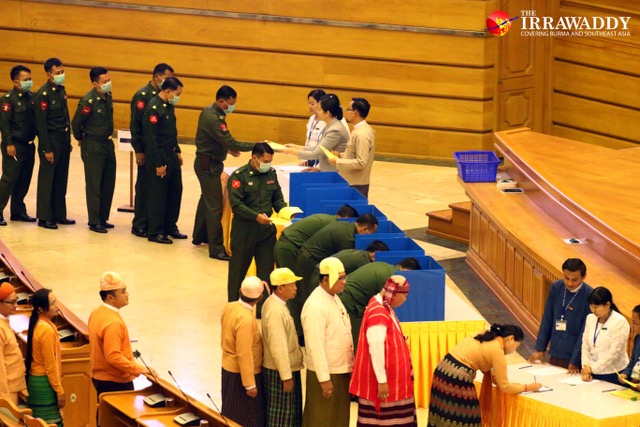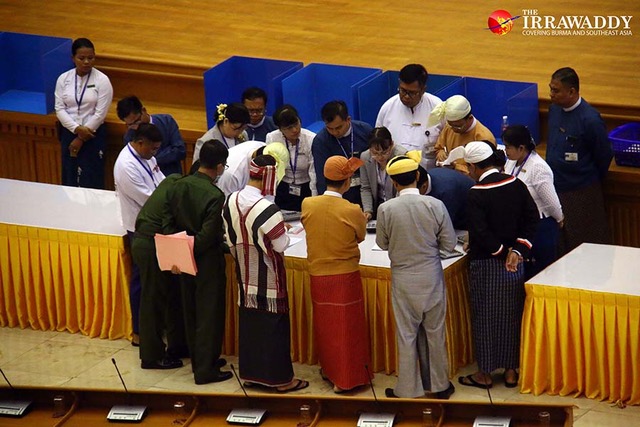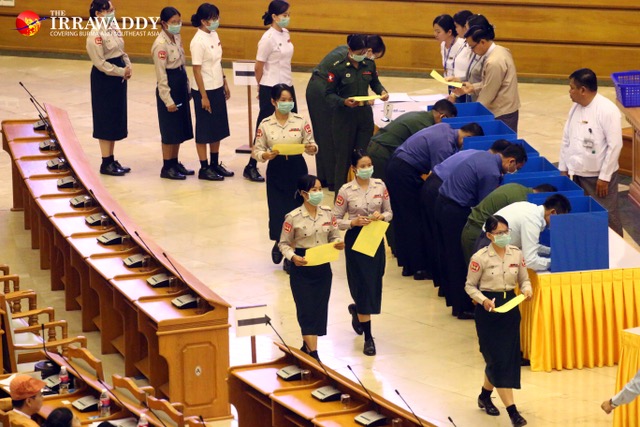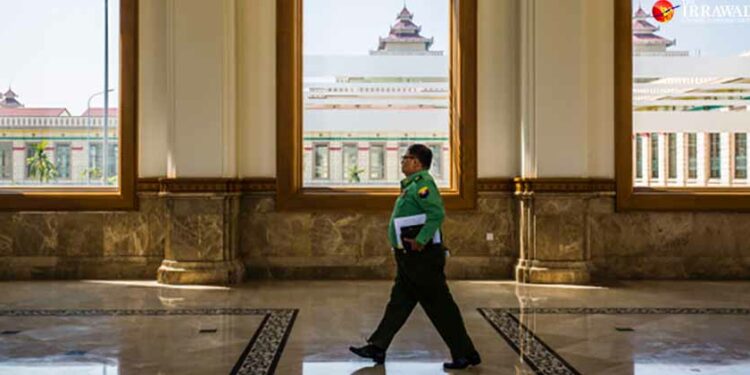YANGON — More than a yearlong effort by the National League for Democracy (NLD) to amend the military-drafted 2008 Constitution has ended in failure after rejection by the military and its proxy Union Solidarity and Development Party (USDP).
Military-appointed and USDP lawmakers, which together have about 31 percent of parliamentary seats, rejected all the NLD’s amendment proposals that sought to limit or revoke the special powers and privileges granted by the charter to military and its chief in the legislative, administrative and judicial branches of government.
Here is a list of key amendments that were not accepted by the military appointees and the USDP during nine days of parliamentary votes until March 20.
Military’s political dominance continues
The NLD’s proposals to end the defense services’ national political leadership role, gradually reduce its share of seats and end both the commander-in-chief’s role as the supreme commander of the armed forces and his right to take power during an emergency were all rejected. They all failed to receive more than 75 percent support.
The NLD suggested gradually reducing the military’s share of seats from 25 percent to 15 percent after the 2020 election, 10 percent after 2025 and 5 percent after 2030. The proposal received 404 votes, about 62 percent of lawmakers.

Democracy will remain “disciplined”
The NLD proposals to remove the word “disciplined” before “democracy” in the charter were rejected. The Constitution states the “flourishing of a genuine, disciplined multiparty democratic system” as one of the Union’s primary objectives and that, “the Union practices a genuine, disciplined multiparty democratic system”.
Daw Aung San Suu Kyi remains banned from the presidency
The NLD’s proposal to scrap Article 59(f) that bars anyone from becoming president if their spouse, either of their parents or any of their children or their children’s spouses are citizens of a foreign country, was rejected.
The article is widely viewed as targeting Daw Aung San Suu Kyi, whose children are British, as was her late husband.
USDP lawmaker and former lieutenant-general U Thaung Aye said preserving Article 59(f) was a victory for the nation.
“The sovereignty of the country was successfully kept in the hands of our ethnic brothers and sisters, and the presidency and vice presidency kept clear of foreign influence… We don’t want [Article 59(f)] to be repealed,” the former officer told reporters in Naypyitaw.
Military retains dominance on national security body
The NLD’s proposal to reduce the military’s dominance of the country’s most authoritative security body, the National Defense and Security Council (NDSC), along with its power to take control during a state of emergency and another that would make the Supreme Court indisputably the country’s highest legal authority were also rejected. The Constitution currently places the Supreme Court under military courts-martial in terms of legal authority.
The NDSC includes the president, two vice presidents (one of whom is appointed by the military), both parliamentary speakers, the commander-in-chief and deputy commander-in-chief, the minister of foreign affairs and the military-appointed defense, home affairs and border affairs ministers.
The NLD suggested that the two deputy parliamentary speakers be added, as the current 11 members already include the vice presidents and the deputy commander-in-chief. It also sought to exclude the border affairs minister from the council. The proposals to amend the NDSC’s composition received approval from about 63 percent of lawmakers.

Military chief’s emergency powers
The Constitution grants sovereign power to the commander-in-chief in emergencies, including the rights to control the legislature, executive and judiciary.
Under Article 412(a), the president may declare a state of emergency in any situation that could lead to the disintegration of the country or a loss of sovereign power, or if there is an attempt to take power through force, including an insurgency.
The president must coordinate with the NDSC and if all 11 members of the NSDC are unable to attend, the president must coordinate with the military representatives. The president is also required to submit a state of emergency declaration to the NDSC for approval as soon as possible. The NLD failed to repeal both provisions.
Military retains veto on constitutional change
On the fourth day of voting, the NLD’s proposal to remove the military’s veto over constitutional amendments was rejected. The NLD proposed lowering the threshold for approving a charter amendment from more than 75 percent to “two-thirds of elected representatives,” which would exclude military appointees. The proposal received about 414 votes in favor or 64 percent of lawmakers.
Generals keep amnesty control
On the fifth day of parliamentary voting, the NLD’s proposal to grant the president full power to declare amnesties was rejected.
Under Article 204(b), the president can only grant amnesties in accordance with the recommendations of the NDSC. The army also controls the Ministry of Home Affairs, which oversees the police and prisons. A total of 403 lawmakers, about 62 percent, voted to approve the proposal, with 227 votes against.
Military maintains its grip on national security
Constitutional amendments that would have ended the defense services’ absolute authority over the armed forces and its exclusive role in safeguarding the country were voted down.
The NLD sought to revoke Article 338, which states, “All the armed forces in the Union shall be under the command of the Defense Services,” and Article 339, which says, “The Defense Services shall lead in safeguarding the Union against all internal and external dangers.” The latter can be interpreted as giving the institution sole, undiluted power in this sphere.
Article 338 is one of the most controversial articles. Pro-democracy activists have long targeted it for amendment, saying the police should be administered by a civilian government.
Both proposals received 407 votes, accounting for about 63 percent of lawmakers.

Immunity for former junta chiefs
The proposal to end constitutional impunity for members of the former junta failed to pass.
The Constitution effectively shields generals and any other members of the military government that drafted the charter from future prosecution for human rights violations.
Article 445 in the “Transitory Provisions” chapter states no proceeding shall be instituted against the State Law and Order Restoration Council (SLORC) and State Peace and Development Council (SPDC) or any of its members in the execution of their duties. The proposal to remove the provision received the 408 votes or 62.3 percent and 218 against.
The NLD proposals calling for a change to the national flag and the removal of all provisions under the Transitory Provisions Chapter were also rejected on Friday.
Only four amendments were approved
Of the NLD’s 114 constitutional proposals, only four minor changes received the required support from more than 75 percent of lawmakers. The approved amendments will change Burmese-language references to “disabled military officers” in three provisions. It will also remove language deemed unnecessary in a passage under the appointment of regional or state minister saying, “a regional or state minister could be appointed from among elected representatives or from among those who are not elected representatives”, assuming they meet the other requirements.
You may also like these stories:
NLD Proposal to End Immunity for Myanmar’s Ex-Military Govt Fails to Pass in Charter Vote
Myanmar Military Chief Retains Special Powers as NLD Charter Reforms Stymied

















